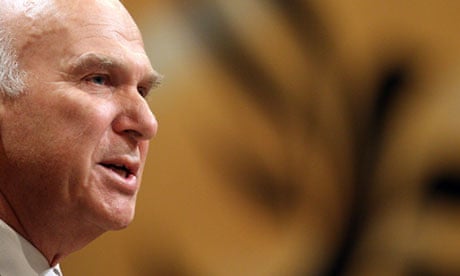Vince Cable will publicly call on Monday for the chancellor to drop any plans for cuts in spending on engineering, science and further education from his autumn statement.
The business secretary will insist that the coalition must keep on investing for the long term rather than look to short-term fixes.
In a speech he will say that spending with the potential to spark economic growth, including the money ringfenced for research in science and engineering, is a "basic minimum" to maintain the country's competitiveness.
Cable will also add his voice to those frustrated at the coalition's totemic Tory target of cutting net immigration to "tens of thousands", by stating: "Being open for business means being open to overseas talent as well as overseas investors."
However, the Observer understands that the main focus of Cable's speech will deal with the need to maintain a focus on long-term growth even if spending is unlikely to reap rewards before 2015.
George Osborne is said to be drawing up plans for "nuclear" cuts this autumn. The budget for science and engineering research was thought to be fortunate in not only avoiding cuts in last year's autumn statement but seeing an increase of £200m.
In his speech to the Confederation of British Industry, Cable will hint at behind-the-scenes negotiations within the coalition, warning the chancellor against taking "political soft options" when he comes to speak to the Commons in December.
While admitting that the government faces serious financial constraints which will continue into the "middle of the decade", Cable will say: "Now the main areas of higher education that still enjoy considerable financial support from government are subjects like engineering and science and the research ringfence which is the basic minimum to protect Britain's scientific competitiveness.
"We need to build on our excellence in science, and improve how we turn great ideas into great businesses."
He will add: "There has to be some prioritisation connecting public spending in areas which contribute to recovery and growth, not on the political soft options." The Liberal Democrat will follow a speech by the prime minister at the CBI, where Cameron is expected to depict Britain as being in a "global race" for growth and expand on the need to improve competitiveness.
Cable will say that the UK has "had a difficult time" but claim that there are now some "reassuring figures on job creation, falling unemployment, falling inflation and business startups", creating an "upbeat mood" in business.
He will hit back, however, at those, including on the Tory backbenches, who believe that the only role for government is cutting regulation and unleashing British business, leaving it responsible for research and training. He will say: "For wide swaths of training and education there are valuable spillovers which mean that the private sector needs support from the government. That is why I have been so determined to protect and grow apprenticeships and put higher education on a sustainable footing."
In a sign of the Liberal Democrat side of the coalition's frustration at the coalition's immigration policies, Cable will also say that the country needs to "remain open to the many talented and entrepreneurial people that throng to our shores to learn, work and invest". He will add: "That is how over the years Britain has gained so much of its industrial and business expertise."
London mayor Boris Johnson has said that visa policies were preventing the City and universities from recruiting the brightest talent, and were "a block to growth".
John Cridland, the CBI director general, for the first time last week called on Cameron to scrap the policy.
Former Lib Dem Treasury spokesman Lord Oakeshott said on Saturday that it was crucial for his party's future to ensure that the coalition's growth strategy was bold. He said: "The Lib Dem share of the vote in the three byelections dropped by three fifths – from 21% to 8%.
"Our ratings are flat on the floor, like the economy outside London. We must be much bolder and more decisive to get growth in both, starting with the autumn statement on 5 December. Otherwise we will keep taking most of the bullets for the coalition."

Comments (…)
Sign in or create your Guardian account to join the discussion